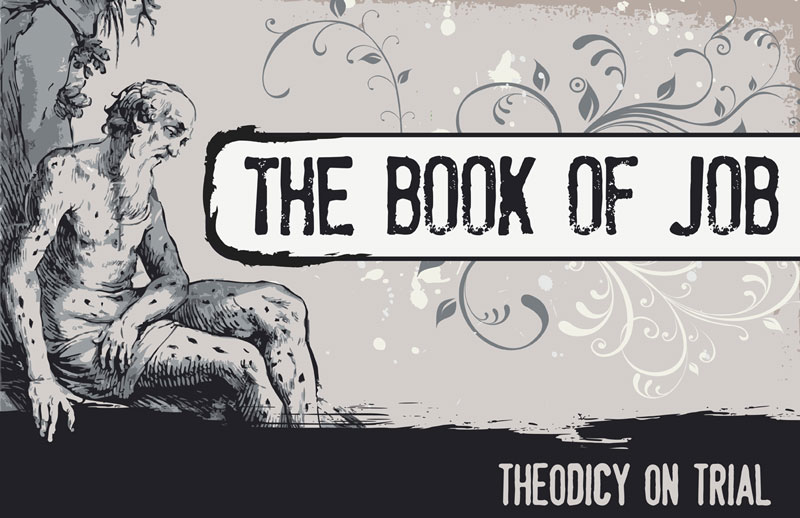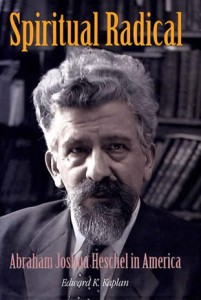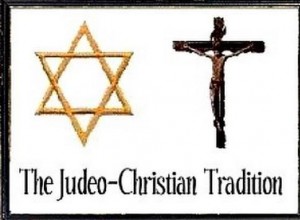 [First posted in 2018. This is from MUST READ: The Jewish Mystique by Ernest van den Haag. Related posts:
[First posted in 2018. This is from MUST READ: The Jewish Mystique by Ernest van den Haag. Related posts:
—Admin1.]
———————–
The stubborn, clumsy, almost absurd integrity of the Jews was no doubt one of the reasons why James Joyce in Ulysses made Leopold Bloom his Homeric hero: not a Greek, or an Irishman, but a Jew. Yet Bloom is not very “Jewish”. Many emancipated Jews are not. This too is a frequent Jewish trait: a reaction to their ethnocentric past. Bloom does not seem religious; he is not very involved with other Jews, apart from his wife; he does not engage in any particularly Jewish activity. He is Jewish only in one thing: it does not occur to him not to be a Jew. To cease being a Jew, to become something else in religion or nationality, is inconceivable to him—though one does not know why.
No doubt, Bloom stands for humanity on its voyage of discovery. In one day he experiences the human career on earth and symbolizes the human, not the Jewish, predicament. But he is a Jew. Nobody is a Jew by accident. Joyce chose a Jew to stand for humanity. He makes him suffer indignities—self-inflicted in a way. But even when grovelling obscenely, Bloom retains some sort of stubborn dignity. No, that is not the word. Humanity is better.
Where does it come from? Jews are human, we all are, but Jews are in a sense more human than any one else: they have witnessed and taken part in more of the human career, they have recorded more of it, shaped more of it, originated and developed more of it, above all, suffered more of it, than any other people. No other nation has witnessed so much, argued and bargained so much, and yet clung to its own inner core as much as the Jews have. They are the perennial fathers, accused, ritually murdered, yet always revived by or reincarnated in the sons who have violently slain them.
For over 2000 years now they have dazed, dazzled, and befuddled the world. They gave our civilization its preeminent religion—but refused to share it, suggesting that this Messiah was for the goyim only. A better one would come—but only for them—at a later time. They have been waiting stubbornly since. A patient people; or are they?
They have given the world some more Messiahs while waiting. And they had a few spurious ones of their own. They gave us Karl Marx, who wanted to save the world by socialism; but Marx was anti-Semitic. He saw Jews as creatures of capitalism, and he hated them also for more personal reasons. They gave the world Sigmund Freud, but, in effect, refused to hire him at the University ofJerusalem.
Not only are Jews ambiguous about their own great men; they are ambiguous even about their own existence. At times they deny that Jewishness is a religion, a race, a nationality, or even a culture—and nearly pretend that it is just something invented by anti-Semites. At other times they imply that non-Jews must be tolerated—God created them too, but why?—although not taken seriously.
Who, then, are the Jews—since, despite all arguments to the contrary, they do exist palpably enough to be killed by a Hitler? Negroes can be recognized by the color of their skin. Not so Jews—they are of all colors. Above all, Jews are ambivalent, almost coquettish. They will go to great lengths and give you numberless instances (though telling you in the same breath that “for instance’ is no proof”) to show that there is no Jewish physical type: German Jews look like Germans and French Jews like Frenchmen. Of course, Jews also say that they can recognize a Jew just by looking at him. The only thing they won’t be is pinned down: experience has taught them that to be pinned down is dangerous.
Is there a Jewish mentality? character? spirit? Heaven forbid! some Jews will exclaim, insisting that Jews are just like other people only they call their church a synagogue (a Greek word) or schul (a German word). Other Jews—or sometimes the same ones in a different mood—will say that there are Jewish character traits—nice ones, of course. And they will explain what makes the Jews so Jewish. Which would be fine, except that just as sometimes they claim nothing for themselves and deny even that they exist as a group, at these times they claim everything: everybody outstanding is either Jewish or ought to be. As the mother of a good friend of mine used to say of anyone she regarded with favour: he must be Jewish.
Having lost their original geographic home, the Jews clung to their spiritual home—their laws, customs, and beliefs—and to each other. They identified with one another through their common background; they distilled the essential identification into personality, intellect, and social life. Without an earthly location of their own, they clung to their heavenly destination, the God who chose them—a universal God, the only true God, and yet their God, by mutual choice.
Just a their God is universal, yet peculiarly theirs, so are many other values. The Jews have clung to and insisted on reason as a universal criterion applicable in all situations. Irrationality has been their enemy. So has tradition. Reason has been their weapon against the traditions, institutions, and superstitions of the Gentile world—for all these served to exclude them. The Jews have been egalitarians—for inequality placed them in the inferior position. They have learned to identify with the oppressed, the humiliated, the suffering—for usually they have been among them.
And yet, no people is more traditional or clings more stubbornly to its customs; no people is more parochial and discriminatory in its feelings and attitudes than the Jewish people. The temper is dogmatic. So is the rationalism. Even Jewish liberals are dogmatically tolerant (and quite intolerant of those who are not, or who tolerate different things). How else could they have survived with their Jewish identity intact? It is this combination of dogmatic traditionalism about anything else, that made it possible for these people to survive as Jews, to reject the traditions that might absorb them, and to retain their own.
A paradox? Yes, perhaps, and essential to the Jewish character, which is an incarnation of the problem inherent in rationalism and dealt with by ambivalence—or, if it is to be avoided, by polarization. To admit that reason does not and cannot explain and, above all, replace the experience of the human career seems perilously near to abdicating and inviting unreason. To pretend that reason can do what it cannot do is to deceive oneself and to refuse to perceive what one cannot understand; it is to deny experience. Such presumptuousness might invite worse dogma than the mysticism risked by acknowledging the limits of reason. Thus the Jews, ferociously rational, reserved one corner of the universe to tradition: theirs.
All religions have attempted to avoid the horns of the rational-mystical dilemma. And all have reserved mystical corners to themselves while challenging others to defend their faith by reasoned argument. In this the Jews were no exception. But from the viewpoint of rational defense, they had some practical advantages. Their own original faith was in no need of defense: it was shared by their adversaries. The Jews just rejected certain developments of it: Christianity. These additions and changes were as hard—though no harder—to justify by reason as was the original faith; and they, too, were universally shared—but not quite; for the Jews rejected them. Defense against the Jews, the fathers who had repudiated their offspring, was imperative for Christianity. Subsequent centuries responded with anti-Semitism, which finally developed into the prevalently negative yet ambivalent Jewish mystique produced by the Gentiles.
As for the Jews, no other group’s fate has been so affected by the mystique it created for itself, and by the effects of the mystique created by others. Jews (like the devil) became both ridiculous and powerful, contemptible and uncanny, superior and inferior, feared, despised, and sought-after. Despite their importance to Christianity, they became and remained nearly unknown to most Christians.
The question, What is a Jew? has puzzled Jews and Gentiles alike. The latter have sometimes found it easier to kill those called Jews than to define what makes them Jews. And the Jews all too often have been content to be defined by their enemies—as victims.
For Jean Paul Sartre, Jews do not exist: “It is not the Jewish character that provokes anti-Semitism,” he says with perhaps more generosity than accuracy, “but rather anti-Semites who create the Jew”. Sure; and Jews, when speaking to their enemies, seem to agree. Properly speaking, they say, there aren’t any Jews. People like Hitler imagined them. (Unfortunately, Hitler killed real people). Jewishness is not a religion, the argument continues, and never, but never, a race, or even a culture. These “enlightened” Jews find odd allies for this opinion among the rigidly orthodox Hassidic sect. To the Hassidim, who believe that Jewishness is at once a religion, a race, a people, and a culture, modern emancipated Jews do not exist as Jews at all (much as the Mormons call Christians who do not believe in the prophecy of Joseph Smith “Gentiles”, strangers outside the fold).
The problem of definition is no easier for non-Jews. To some Nazis, Jesus was not really a Jew, but Roosevelt was. To others, Jesus was a Jew, wherefore Christianity was tainted and had to be abandoned. To some Jews, such as Sigmund Freud, Moses was not really a Jew (he was an Egyptian), and the Mosaic religion (like all others) was no more than an anodyne and a collective neurosis. Karl Marx, as anti-Semitic a storm trooper (and as vulgar when, for instance, he called his rival Lasalle a “nigger Jew”), defined Jewishness as a particular kind of nastiness, bound to disappear when capitalism does.
His followers in the Soviet Union agree and are not above helping the disappearance along by giving Jews a push into oblivion here and there. liked to do so physically. To be fair, his successors prefer to exterminate Jewish culture while sparing its bearers. They say to the Jews: if you only stop being Jewish, you can be one of us. The gambit is age-old and was refused steadfastly in the past. To be sure, unlike the Nazis, the Communists persecute Jews for religious and not for racial reasons—a distinction which must seem rather subtle to the victims.
Of course, Marx’s enemies regarded him as a Jew, though his father, who was not religious and didn’t care one way or the other, had converted to Lutheranism for convenience. Jewish Marxists abound, but so do Jewish anti-Marxists; many leading Bolshevists were of Jewish descent, but so are many of the leading anti-Communists in the United States and Russia. The Jewish Marxists who defined Jewishness as a religion, and thought themselves at last rid of it when they became atheists, just brought a grim smile to the lips of their enemies—they had become Jewish atheists. To be a Jew is clearly not just a matter of religion.
Repudiation of what they have given—even self-repudiation—seems a Jewish characteristic. Religion is one of the main instances. There is no people historically more concerned with religion than the Jews, who first made the Bible out of their lives and then made their lives out of the Bible. Yet great numbers of the most famous men the Jews have given to the world either repudiated their own religion for another or repudiated all religion—though many of them continued to feel as Jews and all of them to be counted as Jews.
If Jewishness is not, or not entirely, a matter of religion, what is it then? Is it a felling? I think the answer here is at least a partial “yes”. More perhaps than anything else, a man’s feeling that he is, like it or not, Jewish makes him a Jew. This feeling, even when ambiguous, even when unconscious, often makes others feel so, too—regardless of denial, conversion, or apostasy. The feeling justifies itself. Should it be so? I can only give a Jewish answer: why ask me? Is it so? On the whole, and instances to the contrary notwithstanding, yes.
The feeling cannot be willed. You can become a Catholic by conversion. But a Jew? Does anyone regard Marilyn Monroe or Elizabeth Taylor as Jewish? Did they care seriously? To be sure, they did rhetorically. But the will took the place of what was willed. They wanted to be Jewish (i.e., accepted by their husbands) and though that made them Jewish. But Jews are born, not made.
Legalisms apart, a Jew is counted as one, regardless of baptism or atheism, if he comes from a Jewish family. (This is not true, however, in Israel, where to count as a Jew he must not have converted to Christianity. Jews are but a series of exceptions.) This was one part of the complicated truth which the Nazis grasped. (Enemies are often more clear-sighted than friends.) But in their own distorted way, the Nazis went on to say that a man was Jewish even if only one of his eight great-grandparents had been Jewish, and even if he was not considered Jewish by other Jews. The Nazis deemed him Jewish even if his family had been Christian for many generations. (If this seems odd, consider popular feelings about what percentage of “blood” makes one a Negro.) Distinctions and definitions can become absurd when pushed too far—which does not detract from their soundness on a common-sense level. And on that level, a Jew is a person of predominantly Jewish descent.
This is a social as distinguished from a racial or religious or cultural definition—for clearly, many people whose ancestors were religious Jews are themselves not. The South African tycoon Oppenheimer (DeBeers diamonds, Anglo-American Corp., etc.) is an Episcopalian. Einstein was not a believer although, like Freud, he regarded himself as Jewish. Marx, as we said, was Protestant. Clearly they are all Jews. And what about Barry Goldwater? But Sammy Davis, Jr., can’t make it, no matter how much he would like to be a Jew. And Marilyn Monroe just married one; she would have liked to marry his background and religion as well, but couldn’t do it. Neither Davis nor Marilyn Monroe could feel Jewish. But even if by some miracle they could, they would never be regarded as Jews by Jews.
The Jews are nonevangelical and rather discourage would-be converts. Disavowals notwithstanding, Judaism has essentially remained a tribal religion—even though the Jews invented the most evangelical of the non-tribal religions. When the Apostle Paul made a Jewish sect into a universal religion, he had given up hope for Jewish conversion. And once Christianity was preached to the Gentiles, chances for the conversion of the Jews were reduced to near zero. They would not join a religion that denied their chosenness.
It is often believed (particularly by their friends) that Jews share physical characteristics more with the inhabitants of the country in which they live than with Jews from other countries—German Jews seem more German than Jewish, Italian Jews more Italian than Jewish, Yemenite Jews more Arab than Jewish. But this is only partially true: true often enough to be believed generally, but not generally true. It would stand to reason, of course, owing to long residence and similar geographic, nutritional, and social environment, let alone intermarriage. Indeed, German Jews can be very Germanic (in the eyes of non-Germans) and Russian Jews very Russian (in the eyes of non-Russians).
But what stands to reason seldom works with Jews. Tests made in Israel show quite definitely that if one considers blood type frequency, or types of fingerprint whorls, Yemenite Jews, though separated from them for thousands of years, have more in common with German Jews than German Jews have with non-Jewish Yemenites. In short, the inherited characteristics of Jews—genotype—seem quite well preserved, at least in these specific respects. How important this is for less easily measured, but more important characteristics such as psychic ones, which may be acquired more often than inherited, is hard to say. But to the extent that one can speak of a genotype, one can speak of a Jewish genotype, and one can say that in comparative terms, it is remarkably pure. It seems that Jews have, on the whole, followed the Biblical injunction to keep to themselves and to shun intermarriage. Up to now.
Scattered among alien cultures as they have been now for over two thousand years, how are we to explain this remarkable homogeneity of the Jews? The answer is, in the first place, religion—religion as an all-pervasive norm of conduct and regulation of daily activity. And second, Jews kept their identity because they were not allowed to forget it. A hostile environment took care of that. In the past, their religion distinguished them and led to discrimination against them in the same fundamental way in which skin color today distinguishes Negroes; for his religion was regarded as part of a man’s existence, character, status, and predicament the way skin color has been.
To the Jews religion quite strongly retained its literal meaning ofre-ligare, to re-link. As constantly expounded, interpreted, and elaborated by the rabbis, the Jewish religion became The Law, organizing and regulating every detail of Jewish life in such a way as to keep Jews apart from any other group, strengthening their solidarity and continuing their existence as a sharply identifiable community. External pressures against this alien body, the unending Christian hostility to the Jews, who refused conversion, who lived in their midst but repudiated the essence of the faith which they had generated, merely hardened the institutional structure of the Jewish community.
Christian hostility caused untold suffering borne patiently by the Jews—there was little else they could do other than be converted—but above all, it led to their isolation from the non-Jewish world. Thus their identity was preserved with the help of those who worked to destroy it.
Without hostility, they will survive in greater material comfort and security—but will they remain Jews now that they are no longer forced to be either Christians or Jews?
Although regarded as innovators and anti-traditionalists, the Jews are the most tradition-minded and conservative of all peoples. To be Jewish is to cling to a set of practices and rituals, sacred and profane, to a set of activities and institutions, religious and secular, to a set of attitudes more than to any elaborate beliefs. Above all, the Jews cling to the promise their God made them—even when they no longer believe in God. The promissory note is to be redeemed even after the maker has died—it is a lien on his wealth. Because of the promise, the Jews cleaved to their God. Because of cleaving to their God, they remained Jews. And to remain Jews, they had to do and omit all the things they did and omitted.
In a sense, the promise was fulfilled. They survived where others perished. And they survived as Jews. They even managed to compel the admiration and acceptance of the Gentile world, in which they now occupy leading positions in nearly any branch of activity. Had they not been traditionalists clinging to every law, they could not have remained Jews. And yet, had they not been innovators, unfettered by tradition, creating and utilizing new devices, they could not have survived, let alone achieved what they did achieve.
And innovators they were. There is no new industry, or science, no new movement in art or literature, no new theory in psychology or physics, no new movement in politics or religion in which Jews do not play a prominent part. One simple explanation is, of course, that a high proportion of Jews are intellectually gifted and highly educated. Intellectuals are by definition critical and innovative. Education usually renews tradition as much as it transmits it. However, the highly educated Jew is probably more ready for innovation, on the average, than the highly educated and equally gifted Gentile.
The Jew receives his education in a culture which, though it originated in great part in his own religious tradition, in its secular form is quite different from his own. And he receives it in schools that are dominated by these partly alien traditions, and attended mainly by non-Jewish pupils. He accepts consciously both the people and the traditions, and excels in the skills. But there may well remain a spirit of opposition, an ambivalence in the acceptance that implies a rejection at the same time. And that rejection may well take the form of innovation—for to innovate is always, if not to reject, psychologically at least to overcome, to discard the old.
Einstein was quite dissatisfied with the German Gymnasium he attended. There was little anti-Semitism at the time—at least he did not complain about it in his later autobiographical writings—and he had not come from a piously Jewish home. Nonetheless he found the Gymnasium’s atmosphere uncongenial to his Jewish sensibility. Later, in Switzerland, he absorbed Newtonian physics. Whereupon he went beyond it, to show that Newton’s physics applied only to a special case which Einstein’s physics could include, but did transcend.
Freud studied and learned the neurology and psychology he was taught in Vienna, but was not content with it. He went to France to study the new ideas of Charcot and Bernstein and returned finally to explore wholly unexplored parts of the human psyche and to develop a revolutionary theory of personality.
One may find in the Jewish tradition itself an innovatory as well as a traditional spirit. It is a tradition oddly polarized and balanced between the absolute authority of the law and freedom of cumulative interpretation and adaptation; between the immense authority of the interpreting rabbi and the minimal institutional framework of that authority.
Few are the nations whose recorded history goes back so far and is so complete as that of the Jews; their written history starts with the creation of the world: Genesis. And it includes the wanderings, the battles, politics, family trees and family skeletons, social policies, economics, the successes and failures, and above all, the moral history of this people which believed itself chosen by God for a special destiny, and which—because of that belief—suffered a remarkable fate.
What were they chosen for? Certainly the Jews have been “chosen”, if only for suffering and for survival as an identifiable and continuous group. The Egypt of the Pharaohs which kept them in bondage—where is it now? Mummified in museums, remembered by matzo balls. (Egypt never seems to have been lucky with the Jews—though it is too early still to decide by what dish to remember Nasser.) Babylon vanished; so did the Assyrians. Imperial Rome conquered Jerusalem and vanished—as did the glory that was Greece. Tribes such as the Moabites or Philistines are remembered now only because they fought the Jews, because they became part of Jewish history.
The languages of these civilizations are, at best, preserved only in academic spirits; but Hebrew is still chanted and spoken. It is today once more the language of a country, of the state of Israel—a state which already twice defeated the surrounding Arab tribes, including, this time, Egypt for good measure. Conquered, their capital laid waste, their temple burned, banned from their land, dispersed through history and scattered over the world without king or country, everywhere persecuted, declared enemies of mankind and murderers of God—the Jews remain. And remain Jews. They still believe themselves the Chosen People, even though, contemplating their long history, one may well ask, “Chosen for what?”
As I am writing, the Jews merrily celebrate their 5730th year. For most of these 5730 years, they lived in circumstances so adverse as to defy the imagination. They survived; most of their tormentors did not. Still, even with the patience of Job, they nay well begin to suspect that they were chosen for suffering. Nor has their suffering ended. Nazism is gone and Hitler is dead. But so are six million Jews.
Myths and the mystique that compounds them can become part of the reality they are meant to suggest. Indeed some of the more sanguine philosophers of Madison Avenue claim that the images they fashion become part of the product they advertise. They certainly try to fuse—or confuse—the image and its object, and occasionally they succeed.
Sometimes such a fusion, off Madison Avenue, is quite unavoidable. The images created by poets and historians, for instance, are naturally and spontaneously related to their object. The poet’s image of the world necessarily affects the world to which it holds up the mirror: readers will experience the world, and react to it, through the literary image, and they may even act to make the world conform to the poet’s image.
Historians, on the other hand, are convinced that their image of the past is quite like the past. Luckily for them, their image is the only means through which we can experience the past. And although history may be “the bunk” as Henry Ford is supposed to have said, historians must and do make sense of it; they must give it significance—or else they could not write anything intelligible: they would have to list an endless series of facts without thyme or reason, without distinguishing the “important” from the “unimportant”. The world always has been full of facts. To write about it is to select, to decide what is important, which means to have decided what it is important to, and for—or to give history meaning. In our own life we select, each of us, analogously what is significant. Our individual selection largely depends on our culture, which is characterized by its selections.
It is the Jews who have given the essential meaning to the last two thousand years of Western history. They started by attempting to give meaning to their own life, to create a mystique for their own use. It had a great deal in common with the mystique of other peoples, but it was distinctive, if not unique, in several respects that remained part of the Jewish religion. Ultimately, a Jewish interpretation of human destiny came to be almost universally accepted—only to be repudiated by the Jews, who were unwilling to lose their group identity by participating as individuals in a larger group; they clung to their group identity, thereby confronting hardships, hostility, and even hatred. Their choice cost them an immense price paid over the past two thousand years. But it was a bargain nonetheless, for it helped unite the Jews and keep them a cohesive, identifiable group. One needn’t be a Jew to understand why Jews value what has cost them so much.
Voltaire once pointed out that Christian historians seem to suggest “that everything in the world had been done on behalf of the Jewish people. . . if God gave the Babylonians authority over Asia, He did so to punish the Jews; if God sent the Romans, He did so to punish [the Jews] once more…” He went on to ask: “Why should the world be made to rotate around the insignificant pimple of Jewry?”
Voltaire did not try to answer his own obviously rhetorical question. Yet it might be asked seriously. For the history of the Jews is still more widely read and known than any other, and it is incomparably the most influential of the histories of the Western world. For centuries it has been a source of inspiration: the history of the Jews became the Bible. It has been used to make the world intelligible, to justify the universe and its Creator, not only to the Jews before and after Christ, but to Christianity and Islam as well. The Bible is not only the best-selling book of all time, but also the most widely read.
Most peoples see themselves as the center of the universe. But why did the rest of humanity finally share the Jewish version of the world history? Why did they all believe the world rotated around the Jews? Why did Jewish history become the prototype for the history of the world? If the Jews are as “insignificant” as the nonbeliever Voltaire suggests, why did this numerically tiny and powerless people loom so large in Western history?
To believers, the answer is plain. The Jews were important to God, so they must be important to all who believe in Him. But many nonbelievers, too, such as Hitler, thought the Jews important and powerful beyond their numbers. Why are they believed to be important not only by their friends, but even more so by all their enemies? Their existence itself seems uncanny, as does their relationship to the rest of the world. How did they arouse—and survive—so much hostility? Will they survive emancipation? Now that they have their own territorial state once more, will they survive as a cultural and spiritual entity? The question sounds paradoxical. But Jews are but a series of paradoxes.
The Jews are and were at various times in history the most despised and the most sought-after and needed people. They were constantly expelled from Christian countries only to be reinvited, constantly robbed only to become rich again, curbed and oppressed only to be suspected of secretly running the world and, of course, of causing all that goes wrong with it. Much of this was done in the name of one of their own.
For though they did not recognize Jesus as the Redeemer, He certainly was a Jew, as were His apostles. The Jews suffered through many centuries for refusing to accept their own kin as mankind’s Redeemer. But to this people, often regarded as overly materialistic or rationalistic, the price never seemed too high. They have refused to this day the acceptance which would have ended their sufferings, for to accept Him would be to end their existence as an identifiable group, as the Chosen People. No wonder that a legend should have grown about a people so ubiquitous and well known yet so mysterious and full of contradictions, so shrouded in mystery yet bathed in the glare of historical records better known than those of any other people.























